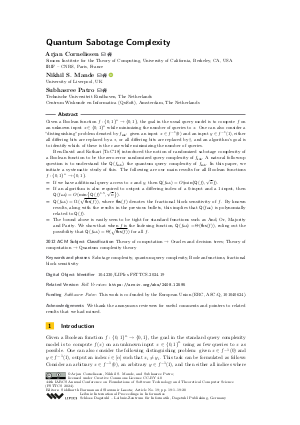LIPIcs.FSTTCS.2024.19.pdf
- Filesize: 0.8 MB
- 20 pages

 Creative Commons Attribution 4.0 International license
Creative Commons Attribution 4.0 International license

Given a Boolean function f : {0,1}ⁿ → {0,1}, the goal in the usual query model is to compute f on an unknown input x ∈ {0,1}ⁿ while minimizing the number of queries to x. One can also consider a "distinguishing" problem denoted by f_sab: given an input x ∈ f^{-1}(0) and an input y ∈ f^{-1}(1), either all differing bits are replaced by a *, or all differing bits are replaced by †, and an algorithm’s goal is to identify which of these is the case while minimizing the number of queries.
Ben-David and Kothari [ToC'18] introduced the notion of randomized sabotage complexity of a Boolean function to be the zero-error randomized query complexity of f_sab. A natural follow-up question is to understand the 𝖰(f_sab), the quantum query complexity of f_sab. In this paper, we initiate a systematic study of this. The following are our main results for all Boolean functions f : {0,1}ⁿ → {0,1}.
- If we have additional query access to x and y, then 𝖰(f_sab) = O(min{𝖰(f),√n}).
- If an algorithm is also required to output a differing index of a 0-input and a 1-input, then 𝖰(f_sab) = O(min{𝖰(f)^{1.5}, √n}).
- 𝖰(f_sab) = Ω(√{fbs(f)}), where fbs(f) denotes the fractional block sensitivity of f. By known results, along with the results in the previous bullets, this implies that 𝖰(f_sab) is polynomially related to 𝖰(f).
- The bound above is easily seen to be tight for standard functions such as And, Or, Majority and Parity. We show that when f is the Indexing function, 𝖰(f_sab) = Θ(fbs(f)), ruling out the possibility that 𝖰(f_sab) = Θ(√{fbs(f)}) for all f.

Feedback for Dagstuhl Publishing